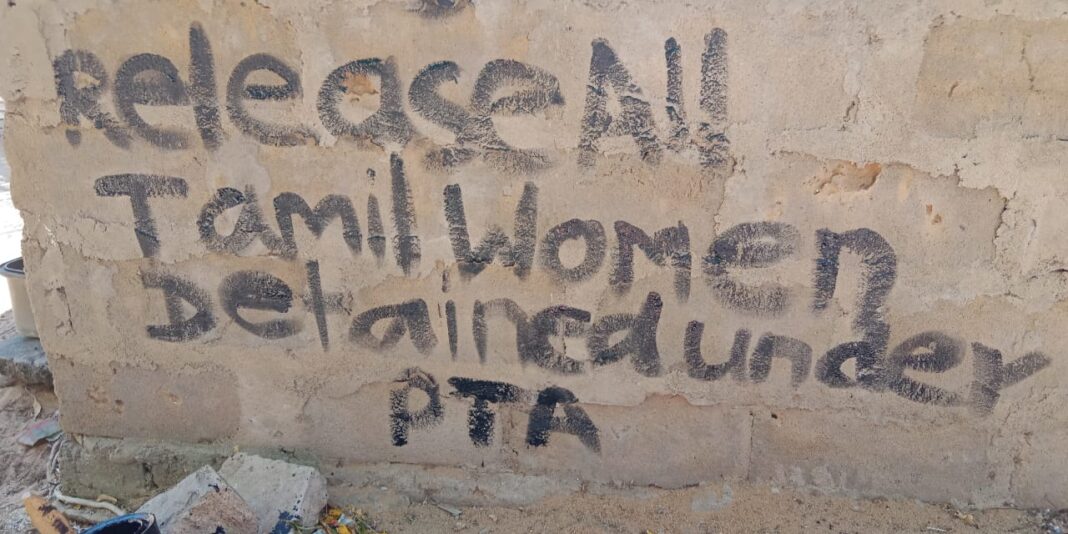Image: A graffiti in North of Sri Lanka calling for the release of PTA prisoners.
In a communication to Sri Lanka Government seven UN Special Rapporteurs have put forward five benchmarks to consider in any meaningful reform of the Prevention of Terrorism Act of Sri Lanka. In conclusion it has called for detailed information on the issued raised in the communication.
The communication says that:
“Enforcement of the PTA and subsequent Regulation has resulted in significant and detrimental impacts on the promotion and protection of several fundamental freedoms. In particular, we are concerned that the law lacks precision in key aspects creating opportunities for misuse due to broadly worded and vague provisions.
Benchmark 1: We recommend amending the definition of terrorism and other vague provisions, including rescinding language on “extremism,”8 which has no purchase under international law to ensure definitions and language employed are in compliance with Sri Lanka’s international human rights obligations.
(2) Ensure precision and legal certainty, especially when legislation may impact the rights of freedom of expression, opinion, and religion or belief
Benchmark 2: We respectfully recall the previous communication to your Excellency’s Government and recommend the following:
a. Amend the PTA and relevant legislation to precisely define what speech is prohibited consistent with the requirements of article 19 (3) to ensure no unlawful interference with the freedom of expression and opinion, as well as of association.
b. Amend the vague language of causing or intending to cause ‘violence or racial, religious or communal disharmony’ by ‘words either spoken or intended to be read or signs or visible representations or otherwise’, which as noted above may violate the right to freedom of thought, conscience, and religion.
Benchmark 3: We respectfully recall the above analysis and recommend amendment of detention provisions as well as administrative and judicial safeguards to prevent the continued arbitrary arrest and detention of individuals inconsistent with international law standards. Recommended benchmarks are as follows:
a. Amendment to make it clear which ‘persons or body of persons’ may be authorized by the President to wield arresting power, and to prohibit retroactive authorization of ‘persons or body of persons’ who might make an arrest under the PTA and subsequent Regulations.
b. Amendment to ensure that there are standards and criteria, including record keeping procedures, set out to ensure that a person has not been detained outside the bounds of the law before being handed over to the police station and to remedy the presumption that detention occurs before the commencement of an investigation.
Benchmark 4: We respectfully recall the above standards and recommend immediate amendments to address the full scope of the requirements of the UN CAT and the Standard Minimum Rules for the Treatment of Prisoners across all detention practices, rules, provisions, and powers. Meaningful amendments can only be made by ensuring that these protocols are addressed and current conditions that increase the likelihood of torture are urgently remedied.
Benchmark 5: Recalling the above analysis on the international human rights law deficits, specifically the lack of fair trial guarantees, continued and extended deprivation of liberty without due process, and the full scope of overarching lack of judicial oversight of detention practices, we recommend amendment of the PTA in line with the above and past communications. Amendments should aim to bring all processes in line with due process obligations under the ICCPR and UDHR.
Conclusion
We wish to reiterate the importance of meaningful reform of the PTA. The continued risk to the rights and liberties of persons who may be detained arbitrarily, especially religious and ethnic minorities, and may curtail political dissent with no effective due process guarantees remains at the core of their concern. Lack of judicial oversight and effective due process standards could facilitate institutional contexts where misuse can occur. We urge your Excellency’s Government to immediately commence with a thorough examination of the PTA with a view to amend all relevant provisions and ensure that human rights are respected and protected under the auspices of countering terrorism. Further, we recommend an immediate moratorium on its use until such time as the necessary amendments can be made.
As it is our responsibility, under the mandates provided to us by the Human Rights Council, to seek to clarify all cases brought to our attention, we would be grateful for your observations on the following matters and the planned or in process amendments to the Regulation and how it brings the legislation into compliance with international law obligations.
Please provide any additional information and/or comment(s) you may have on the above-mentioned concerns.
1. Please provide detailed information of how the counterterrorism efforts of Your Excellency’s Government and planned or in process amendments will comply with international obligations, including the benchmarks highlighted in this communication, specifically ensuring that any amendments:
a) Employ definitions of terrorism that comply with international norms;
b) Ensure precision and legal certainty, especially when legislation may impact the rights of freedom of expression, opinion, association and religion or belief;
c) Institute provisions and measures to prevent and halt arbitrary deprivation of liberty;
d) Ensure preventive measures are in place to prevent torture and enforced disappearance and adhere to their absolute prohibition; and
e) Enable overarching due process and fair trial guarantees, including judicial oversight and access to legal counsel
2. Please provide information in detail of how the counterterrorism efforts of Your Excellency’s Government comply with the United Nations Security Council resolutions 1373 (2001), 1456 (2003), 1566 (2004), 1624 (2005), 2178 (2014), 2242 (2015), 2341 (2017), 2354 (2017), 2368 (2017), 2370 (2017), 2395 (2017) and 2396 (2017) ; as well as Human Rights Council solution 35/34 and General Assembly resolutions 49/60, 51/210, 72/123 and 72/180, in particular with international human rights law requirements of same.
Read the full text as a PDF: SPs on PTA 9 Dec 2021
Read Sri Lanka’s response as a PDF:SL responses to SPs on PTA
